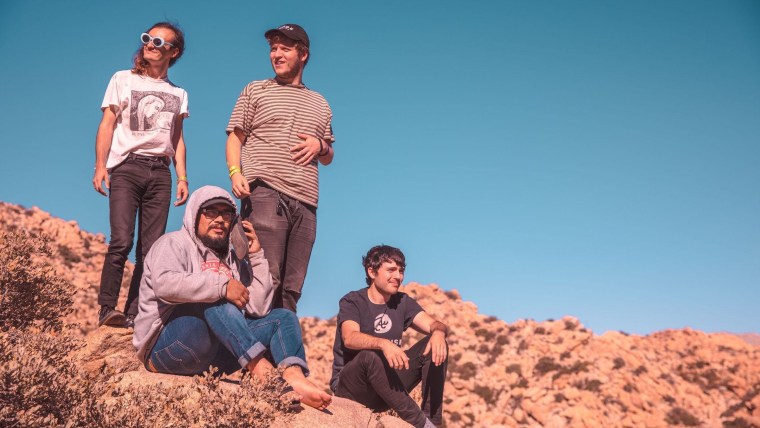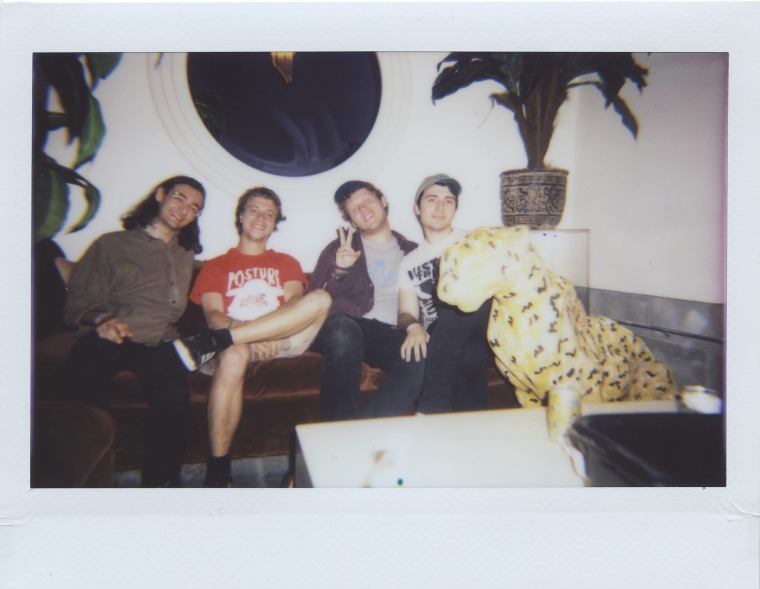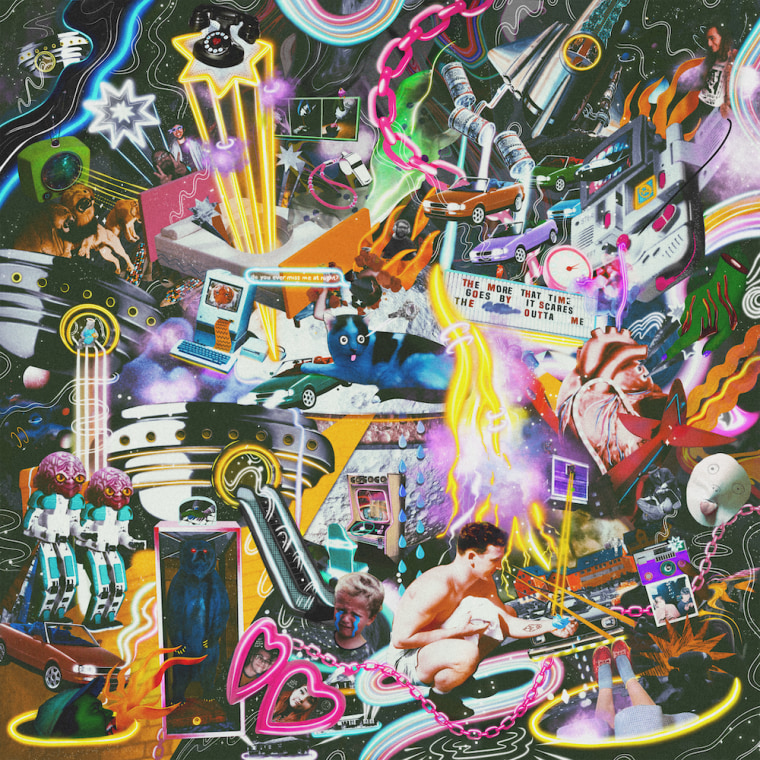 Photo: Joey Tobin
Photo: Joey Tobin
It wasn’t the acid trip four years ago that messed Kory Gregory up. The acid trip was basically fine. It was the post-acid haze that sent him spiraling. The cogs were still turning in his brain for days, then weeks, then months afterwards. “It was just me constantly thinking about the rhyme or reason — what causes what,” he says over the phone from a park by his home just outside of Albany, New York, as he sips on a Twisted Tea. “During the trip, you can convince yourself to give it however many hours and it'll be gone. But when two weeks go by and you're still having little panic attacks about it. It starts to weigh on your mind: Did I permanently pollute my thought process and my appreciation and excitement for life?
He didn’t. But listening to “I Lost My Life,” the first song on punk band Prince Daddy & The Hyena’s sprawling new album Cosmic Thrill Seekers, you wouldn’t know it. “Everything will be alright / If you shake the end of the world vibes,” he screams over an acoustic guitar. “The shit around me's got me tight / I hope I’m coming down tonight.”
Cosmic Thrill Seekers, Prince Daddy & The Hyena’s second full-length, is, by Gregory’s own admission, a “selfish” record. It details the cyclical nature of his mental states, from excitable ecstasy to nervous fear to self-destructive disaster. He started writing the record in a closet in his bedroom in 2015, in the midst of his after-trip existential crisis, as soon as he realized that his psychology mirrored parts of the 1939 film The Wizard of Oz. So, it’s a concept album split into three: The Heart, The Brain, and The Roar. The whole thing is premiering below — in the three parts that Gregory thought it up — ahead of its release this Friday via Counter Intuitive Records.
Gregory makes sure to call it “selfish” not just because the songs are introspective — “Lauren (Track 2)” is a love song more about Gregory’s thoughts than Lauren herself — but because it helps him to remember the temporary nature of his emotions. His raspy, bloodied voice and the shamelessly anthemic pop-punk melodies hold the record together, but there are intentional shifts in tone and tenor. “I’m thinking a fireplace and a small dog / Maybe some dark green and dark purple walls,” he sings, dreaming up an idyll on “Cosmic Thrill Seeking Forever,” the last song on The Brain, “but it’s not safe to think about forever…” It’s a concept album, so that obviously opens up into some brilliantly ostentatious, duelling guitars and, on Gregory’s lyric sheet, an all-caps “...TO BE CONTINUED.” It shuts down before “Slip” and “The Prototype of The Ultimate Lifeform” lead into “Breather,” the nerviest song on the record: “If I make it home / I might not step foot outside again.” In that context, the relative release of the third section, in which Gregory can’t says yes to everything in an attempt to drown his fears, is a relief. On “Klonopin,” he’s brief: “Someone get fucked up with me in the day time.”
In short, Cosmic Thrill Seekers is a punk concept album from the mind of a guy who cites Titus Andronicus’s The Monitor, Green Day’s American Idiot, and My Chemical Romance’s The Black Parade as three of his primary inspirations for a narrative arc. Or, as Gregory succinctly puts it, this is “Disney-punk.” That’s how he described it first: “We just want to make it sound like the soundtrack to a Disney film played by a punk rock band. I think we did that.”
Listen to Cosmic Thrill Seekers in full below and read our interview with Gregory after the jump.
You’ve said that you saw the parallels between The Wizard of Oz and your mental state. Did you start writing the record as soon as you noticed that?
That realization is what kickstarted me writing the record. I'm an obsession-driven songwriter; I can't really write songs unless I have a specific destination for them. So, I kind of have to conceptualize the bigger picture before I start to write songs.
Did you know straight away that you wanted this to come out as a three-part album?
By the time I started writing the record, yeah. The first couple of months of writing the record was really just me organizing my thoughts and just conceptualizing it, and by the time I actually started writing songs, I definitely had a clear outline of where I wanted it to go and how I wanted it to be told — how I wanted to be organized within the album.
Do you remember what the three songs were?
“I Lost My Life,” the first song, was written so long ago. That song specifically deals with the catalyst for me writing this record, which was a bad acid trip I had. Honestly, the first three songs written are the first three songs on the record. I kind of wrote them in chronological order.
What was so bad about that trip?
The acid trip itself wasn't that bad. It was the days and weeks and months following the acid trip. I guess I just had some realizations that I didn't want to have, and my outlook changed in a way that I didn't really want it to change. It felt permanent. It got me in this snowball effect of obsessing over my mental health and my brain's wellbeing.
I know it sounds cliche, but writing this record was a way for me to have everything on paper and have everything organized. I can just look at this little blueprint I left myself with the record.
 Photo: Sarah Knoll
Photo: Sarah Knoll
So, some of those ideas about the ways the cogs turn in your head — those are the thoughts you were having during the trip, and then they just lingered?
During the trip, you can convince yourself to give it however many hours and it'll be gone. But when two weeks go by and you're still having little panic attacks about it, it starts to weigh on your mind: Did I permanently pollute my thought process and my appreciation and excitement for life? I figured out later down the line that I didn't permanently do that, and that's what this record is about. It definitely is pushing the concept of the different phases of my mental health's cyclical nature. There's a sense on the record that nothing is permanent, everything's constantly moving. The end of the record loops back into the beginning of the record, and the cycle starts all over again. You're back at Phase One. It helped me realize that, even though I'm in this phase right now, give it a few months and I'll be in this phase. That was also a revelation post-acid trip. This isn't permanent, and none of these feelings will last forever. They'll come and go.
Take me through those stages: The Heart, The Brain, and the Roar.
It's what each period of my life has as the driving factor — the motivation. In Act One, the driving factor, the thing that keeps me going every day and gets me moving, is my heart. So everything's fresh and new, almost to the point where I’m feeling manic. And I don't realize it's a negative feeling at first, but it's very manic. At face value, that act is a bunch of love songs. But I don't think it's that specific — there are love songs, but it's just more just being moved by manic excitement that comes along with new and fresh things, and a romantic relationship is an easy way to express that.
All of these acts are reactionary to the one before. That leads to Act Two, which is the brain, which is the introverted and isolated portion of the story. It's caused by the desire to maintain a sense of security and stability from the previous act. It's definitely the most anxious and isolated segment. It's about the weight of life being too terrifying for you to move, and being held still by these constant feelings of panic. It's really just about being held still.
And then that act would lead directly into The Roar, or the courage, which is just an attempt to break free of that isolation, but doing it in a very unhealthy manner — a destructive, depressive episode. It's being on the end of your rope and just saying yes to whatever comes your way and trying to keep your mind away from whatever scary thoughts it has, regardless of the practicality of whatever your distractions are. It's definitely the darkest segment. So by the end of that, you get to the point... by the last point, the character gets to the point where he's had too much, like anyone would. You get exhausted, and you realize that that's not sustainable at all. You come to these tiny micro-realizations that you miss your mom or you miss your bed or you miss a regular sense of security or comfort, and that leads back into phase one, and then it all starts again and they all react to each other. I feel like I'm still living in that cycle currently.
You said "he" — is this a character for you?
No, I say that just because I feel like I wrote a very selfish record, in a multitude of senses. Lyrically, it's very selfish. There is obviously notions of the Wizard of Oz, and there's the lion, the tin man, the scarecrow, the passenger. But overall, these characters are just me in different cycles.
And it's very selfish in the sense that most of the record was written before anyone in the band even heard it. I locked myself away in a closet without showing people the songs until I had a 75 percent skeleton of the entire record front to back. So it was definitely a very selfish writing process, and it came out to a very selfish end product, too. I'm very proud of it, but it's definitely very selfish.
Why did you feel like it was so important to keep it to yourself until it was almost done?
The most literal reason would be my own insecurities. To be totally honest. I can't sit down and write a song with someone else in the room. I can't sit down with our band and write a song. I just can't do that.
Had you at least explained the concept to the band before you brought it to them?
I'd say... we would have conversations about what the album was before I showed them the songs. I think they knew what my plan was and what my vision was for the record before they heard it. It was very deliberate. Everything on the album had to be deliberate.
Prince Daddy & The Hyena’s Cosmic Thrill Seekers is out this Friday, June 28, via Counter Intuitive Records. Pre-order the album here, and check out the album insert, designed by Kississippi’s Zoe Reynolds, below.
